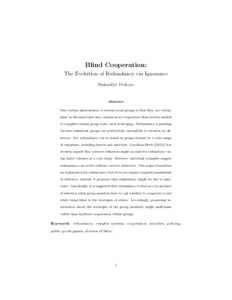Pedroso, Makmiller
(2019)
Blind Cooperation:The Evolution of Redundancy via Ignorance.
[Preprint]
![[img]](https://philsci-archive.pitt.edu/16075/1.hassmallThumbnailVersion/article_group-redundancy.pdf)  Preview |
|
Text (The British Journal for the Philosophy of Science)
article_group-redundancy.pdf
- Accepted Version
Download (311kB)
| Preview
|
Abstract
One curious phenomenon of several social groups is that they are ‘redundant’ in the sense that they contain more cooperators than strictly needed to complete certain group tasks, such as foraging. Redundancy is puzzling because redundant groups are particularly susceptible to invasion by defectors. Yet, redundancy can be found in groups formed by a wide range of organisms, including insects and microbes. Jonathan Birch ([2012]) has recently argued that coercive behaviors might account for redundancy using insect colonies as a case study. However, microbial examples suggest redundancy can evolve without coercive behaviors. This paper formulates an explanation for redundancy that does not require targeted punishment of defectors; instead, it proposes that redundancy might be due to ignorance. Specifically, it is suggested that redundancy evolves as a by-product of selection when group members have to opt whether to cooperate or not while being blind to the strategies of others. Accordingly, possessing information about the strategies of the group members might undermine rather than facilitate cooperation within groups.
Monthly Views for the past 3 years
Monthly Downloads for the past 3 years
Plum Analytics
Actions (login required)
 |
View Item |



